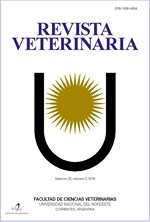Effect of feed intake of Leucaena leucocephala on gastrointestinal parasitic load of weaned calves
DOI:
https://doi.org/10.30972/vet.3024127Keywords:
Calves, gastrointestinal nematodes, Leucaena leucocephala, reduction of eggs/gramAbstract
The present study was carried out during 105 days in Pilagás (For-mosa, Argentina) to evaluate the effect of Leucaena sp consumed by weaned calves on the gastrointestinal parasitic load. Thirty calves were divided into two groups: grazing Leucaena (TREATED with/L; n=15) or without consumption of Leucaena (TREATED without/L; n=15). This essay was performed in a direct grazing system and animals were naturally infected under the conditions of Pilagás forage. Animals in the TREATED with/L group grazed in an interseeding of Leucaena leucocephala with Bra-chiaria brizantha while the TREATED without/L group grazed only on B. brizantha. Eggs per gram (EPG) were determined from feces. Fecal culture and identification of larvae were also performed for each experimental group. Hemotocrit (Ht) was measured and animals were weight. The main genera recovered in the fecal samples were: Haemonchus, Trichostrongylus, and Bunostomum. Oesophagostomum, Cooperia and Strongyloides were less abundant. Since the second sampling, animals with Ht ≤ 22% required albendazole administration since health was compromised. During the whole study, only one calf under TREATED with/L required treatment, whereas in the other group (TREATED without/L) nine animals needed treatment. In relation to EPG, signif-icant differences were registered for the second and forth sampling (p value of 0.3 and 0.006, respectively) in favor of TREATED without/L group. We conclude that under the conditions for the present study, L. leucocephala intake exerts an effect over EPG. Therefore, future assays should be performed for a better understanding regarding an alternative integral control of parasites.
Downloads
Downloads
Additional Files
Published
How to Cite
Issue
Section
License
Copyright (c) 2019 C. Figueroa, O. Mancebo, V. Scribano, T. Rigonatto

This work is licensed under a Creative Commons Attribution-NonCommercial 4.0 International License.
Revista Veterinaria (Rev. Vet.) maintains a commitment to the policies of Open Access to scientific information, as it considers that both scientific publications as well as research investigations funded by public resources should circulate freely without restrictions. Revista Veterinaria (Rev. Vet.) ratifies the Open Access model in which scientific publications are made freely available at no cost online.











.jpg)
.jpg)



